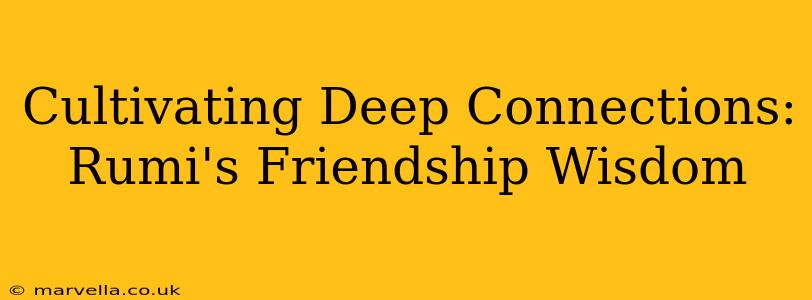The 13th-century Persian poet and Sufi mystic, Rumi, penned verses that resonate with timeless wisdom, offering profound insights into the human condition. Beyond his captivating poetry on love and spirituality, Rumi's work reveals a deep understanding of friendship, its intricacies, and its power to shape our lives. His words offer a roadmap for cultivating meaningful connections that nourish the soul and enrich our journey. This exploration delves into Rumi's perspective on friendship, examining his teachings on genuine connection, the importance of selfless giving, and the transformative power of shared experiences.
What are the key elements of a true friendship according to Rumi?
Rumi believed that true friendship transcended superficiality; it demanded authenticity, vulnerability, and a willingness to embrace both joy and sorrow together. He emphasized the importance of shared understanding, not just surface-level agreement. A true friend, in Rumi's eyes, sees beyond the masks we wear and accepts us completely, flaws and all. This acceptance fosters a safe space for growth, allowing for both vulnerability and the celebration of shared triumphs. He didn't just speak of fleeting camaraderie, but of a bond forged through mutual respect, empathy, and unwavering support, a connection that nourishes the soul.
How does Rumi's poetry address the challenges of maintaining friendships?
Rumi's poetry doesn't shy away from the realities of friendship. He acknowledges that conflicts and disagreements are inevitable. However, he stresses that these challenges are opportunities for growth and deeper understanding. His verses often highlight the importance of forgiveness, compassion, and a willingness to work through difficulties, acknowledging that true friendships require effort and commitment. The capacity to forgive and to be forgiven is central to overcoming obstacles and maintaining a lasting bond. He understood that time and distance can test a friendship, but a genuine connection can withstand these trials.
How does Rumi define the role of selfless giving in friendship?
Rumi viewed selfless giving as the cornerstone of meaningful relationships. It wasn't about transactional exchanges but about freely offering oneself to another, without expectation of reciprocation. This wasn't necessarily about grand gestures; rather, it was about the small, consistent acts of kindness, empathy, and support that demonstrate genuine care and concern. He viewed friendship as a two-way street where both individuals contribute equally and selflessly, enriching the lives of one another. This mutual giving fosters a deep sense of connection and mutual respect, strengthening the bond over time.
What role does shared experience play in Rumi's concept of friendship?
Shared experiences form the bedrock of enduring friendships in Rumi's perspective. Whether it's celebrating joys or navigating hardships together, these shared moments create lasting memories and strengthen the bond. These experiences build trust, deepen understanding, and cultivate a sense of shared history. The ability to laugh together, cry together, and support each other through life's journey creates an unbreakable bond that transcends time and distance. These shared moments become chapters in the story of a friendship, etching themselves in the memory and strengthening the connection.
What is the transformative power of friendship according to Rumi?
For Rumi, friendship possessed a transformative power, capable of shaping our character and spiritual growth. Through genuine connections, we learn empathy, compassion, and selflessness. We are challenged to grow, to confront our flaws, and to become better versions of ourselves. These relationships act as mirrors reflecting our strengths and weaknesses, guiding us on a path of self-discovery and spiritual awakening. The transformative power of friendship lies in its capacity to foster personal growth and inspire us to live more meaningful lives.
Conclusion:
Rumi's wisdom on friendship transcends the temporal; his teachings offer timeless guidance for cultivating deep and meaningful connections. By embracing authenticity, selfless giving, and shared experiences, we can nurture relationships that enrich our lives and guide us on a path of personal growth and spiritual fulfillment. His words serve as a powerful reminder of the profound impact true friendship can have on our journey.

